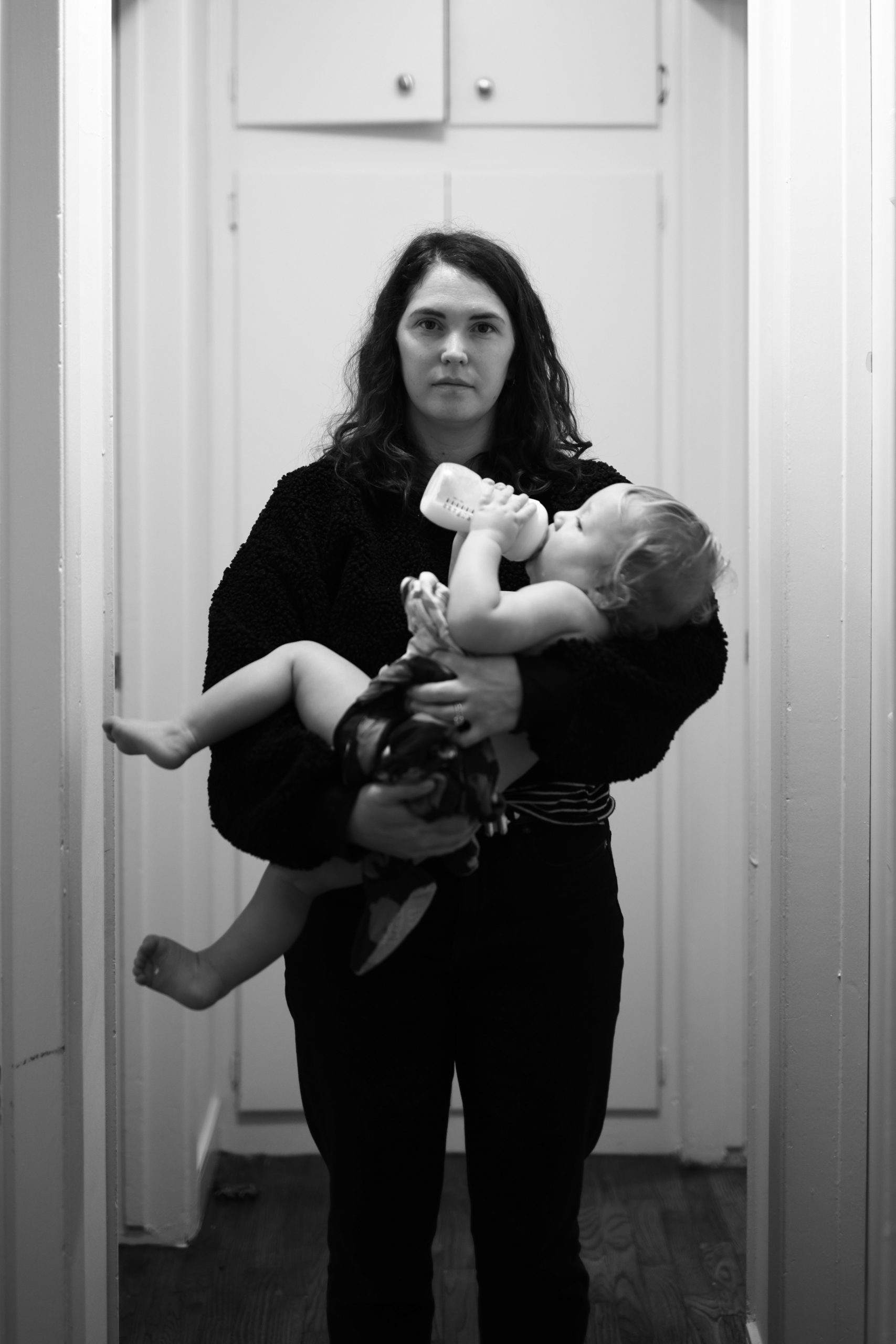
“The amount of unpaid labour performed by women is very large and very profitable to those who own the means of production. To pay women for their work, even at minimum wage scales, would involve a massive redistribution of wealth.” ~ Margaret Benston, 1972
You might not consider the kitchen of a new mother to be fertile ground for political philosophy, but the endless unseen and undervalued labour of a stay-at-home mom has provided me rich and unexpected insight into the division of labour in our society.
I grew up in a fairly political family. Both my parents were journalists; my mother wrote about health from a second-wave feminist perspective, and my father is an environmental journalist with a prominent, left-wing think-tank.
Though I never saw myself as a political person (I graduated from university but only so that I could dance, graduating with a pretty useful BFA in, you guessed it, “contemporary dance”), I did examine social issues through my art. Yet, like so many in their early 20s, my thoughts infrequently went to mothers and families, let alone where they fit in a political context.
To me, family life stood outside of activism and engagement. It was where politics and activism went to die. It was that murky, far-away place, after the engaged and relevant days of one’s youth called “settling down”—”settling down” cloaked in invisibility and lacking any relevancy to the real issues out there in the non-mother, non-coupled world.
This was likely stoked further by the art world I was a part of, which favoured youth at all costs.
Dancers were never mothers.
The few mothers I did know in that community had faced shame and ostracizing after they had had their children.
It wasn’t until I became a mother myself that I realized this wasn’t just part of the dance or arts community.
No one values mothers under capitalism, and they certainly don’t value their labour.
Sure, mothers have been valued, or historically feared, for their power to give birth. For those who have not crossed that particular threshold, it retains an almost out-of-this-world aura. Even for soon-to-be moms, most of the emphasis is given to the labour of birth.
Don’t get me wrong; birth is a rite of passage to be celebrated, yes. But is not the greater effort the endless hours of labour that go into growing the person once they are out of the womb?
Rarely, did anyone prepare me for the labour of being a mother. And I see now that’s because we live in a society that doesn’t value the labour of mothers. Period. This society, in fact, doesn’t value labour at all.
It wasn’t part of my life plan to become a housewife. I had a vague inkling I wanted children, but I thought it would occur long after I had the career part figured out.
From the one year of maternity leave granted by our government (better to live in Canada than the United States as a new mother), I figured that the labour of a mother must be intense but short-lived. I figured that after that year postpartum, the labour of a mother would simply end. At that point, it would be taken up by day care or another childcare provider.
Due to my own choices, I have decided to be the primary caregiver of my children after one year. And from my own experience, I now know how faulty of a notion that is—that motherhood is somehow over after one year. No matter what kind of parenting choices you are making—going back to work full time or staying home with your children full time or somewhere in between—the reality is that the work of mothers never ends. And it’s never given the value it deserves.
The “housewives” of today are some of the busiest people I know. Many have their own businesses or “side hustles” on top of being a mother. Some homeschool. Others do not. All of them rarely have a moment to themselves. From the moment they get up to the moment they go to bed, they are working.
Cooking, cleaning, getting their children dressed, doing laundry, trying to work on their business, managing appointments, driving their children to activities, creating activities for them at home, getting them to sleep, consoling them, consoling their partners, trying to maintain relationships with friends and family…the work is varied and never-ending.
It seems that our society is backward when it comes to honouring those who work the hardest. The people who make the most money in the world need to do the least amount of effort, compared to the billions of others who work tirelessly day and night for little compensation.
Where do mothers fall in that spectrum?
Most are never paid for their labour. In the States, it is common for mothers to go back to work mere weeks after giving birth. This is in one of the richest nations on the planet. Here, in Canada, it is slightly better, but only for one year. And for that year, you are paid a fraction of what you would earn while working.
But motherhood is time off right? It’s not “work.”
So it got me thinking. What political system would actually value the work of a mother? If the value of our work was based on the simple equation of how much effort goes into something to produce it, wouldn’t motherhood be one of the highest earners?
There is, in fact, a political theory that defines labour with this equation. It’s called the Labour Theory of Value.
The labour theory of value is a “theory of value that argues that the economic value of a good or service is determined by the total amount of ‘socially necessary labour’ required to produce it.”
Essentially, the more labour you put into something, the higher value it has.
It’s usually associated with Marxism, though this has flavours of contemporary anarchist economics as well.
Though times have changed drastically since Marx’s day, many things remain the same, especially when it comes to valuing mothers.
Marx believed that the traditional family unit and mothers served capitalism extremely well.
Domestic labour, childcare, and emotional labour are necessary to keep society functioning. Ultimately, the unpaid work of a mother ends up benefiting the ruling class.
Internally, women begin to devalue themselves when their labour is given no societal value. Though women have various reasons why they want or need to return to work, there is a certain amount of shaming that encourages women to get back to work as quickly as possible, so that they don’t feel useless.
Most women today don’t have a choice. Families need two incomes nowadays just to stay afloat.
Though motherhood has been one of the most challenging “jobs” I’ve ever had, it’s also one of the most rewarding.
I recognize how privileged I am to be able to stay home with my son and soon-to-be-birthed second child.
I value the style of attachment parenting I can adhere to because of this time and space and my partner’s income.
And I also feel rage that capitalism doesn’t honour the mother.
I grieve for the children and the mothers who are separated so soon after birth because the mother has to return to work, since her work as a mother is not deemed important, even though it’s the most important job on the planet.
I dream of a planet and society that pays mothers for the work they do. I dream of the children who get to stay connected to their mothers because their society recognizes how vitally important that connection really is.
Before I became a housewife, I didn’t truly value labour. With my university education and upper-middle class upbringing, I ashamedly admit that I looked down upon those who had to work doing menial tasks.
Motherhood is full of mundane tasks that no one pays you for. And I understand a little bit now of the rage that is simmering underneath our society—the rage of the undervalued and overworked.
Mothers are definitely part of that category.








Read 6 comments and reply